 In Ethiopia films are financed entirely by private businessmen, who anticipate profit out of film production; in a best case, individuals who want to finance films for the love of the art and as a side business with less anticipation of big profit. Yet both groups of producers want to see their production at least covering its own cost and become a sustainable sector.
In Ethiopia films are financed entirely by private businessmen, who anticipate profit out of film production; in a best case, individuals who want to finance films for the love of the art and as a side business with less anticipation of big profit. Yet both groups of producers want to see their production at least covering its own cost and become a sustainable sector.
Afroscreen
29.11.2011 | by Aron Yeshitila
 For the most part, prevailing definitions of gender in African studies have come from disciplines located within the Western body of knowledge. Scholars are often unaware how much these definitions are steeped in the mores and norms of the Judeo-Christian tradition, and the social conventions of European and European American cultures.
For the most part, prevailing definitions of gender in African studies have come from disciplines located within the Western body of knowledge. Scholars are often unaware how much these definitions are steeped in the mores and norms of the Judeo-Christian tradition, and the social conventions of European and European American cultures.
To read
01.11.2011 | by Nkiru Nzegwu
 The stage and the auditorium are darkened. Suddenly a noise of clinking glasses in the audience is to hear. The stage light is slowly moved in, it remains dimmed considerably. The room is bare, dark and corresponds to a black box theatre. One can see a mountain of white cups on the right half of the stage.
The stage and the auditorium are darkened. Suddenly a noise of clinking glasses in the audience is to hear. The stage light is slowly moved in, it remains dimmed considerably. The room is bare, dark and corresponds to a black box theatre. One can see a mountain of white cups on the right half of the stage.
Stages
20.10.2011 | by Grit Köppen
 While some commentators and journalists have dismissed Occupy Wall Street as carnival, lawmakers and policemen did not miss the point. Carnival per se, the Shrovetide festival, hardly exists in the United States anymore, save for Mardi Gras in New Orleans and the West-Indian American or Labor Day Parade in Brooklyn, a pan-Caribbean celebration.The carnivalesque, however, as medium of emancipation and instrument of political protest, is alive and well. (...) Carnivalesque protests are a staple of the anti-corporate globalization movement.
While some commentators and journalists have dismissed Occupy Wall Street as carnival, lawmakers and policemen did not miss the point. Carnival per se, the Shrovetide festival, hardly exists in the United States anymore, save for Mardi Gras in New Orleans and the West-Indian American or Labor Day Parade in Brooklyn, a pan-Caribbean celebration.The carnivalesque, however, as medium of emancipation and instrument of political protest, is alive and well. (...) Carnivalesque protests are a staple of the anti-corporate globalization movement.
City
18.10.2011 | by Claire Tancons
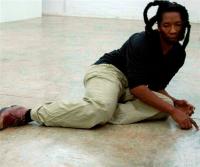 "I think there are so many misconceptions about African cultures. Besides, I use the ideas of used objects for rituals, but the material is different. Sometimes I abstract additionally the movements of such rituals. Anyway, I feel the need to alienate ritual elements; they mainly serve as an inspiration for me".
"I think there are so many misconceptions about African cultures. Besides, I use the ideas of used objects for rituals, but the material is different. Sometimes I abstract additionally the movements of such rituals. Anyway, I feel the need to alienate ritual elements; they mainly serve as an inspiration for me".
Stages
11.10.2011 | by Grit Köppen
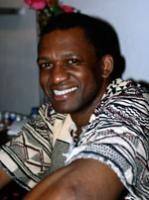 My concern is not to say who is and who is not Angolan. In Angola, as in any modern society, being Angolan is defined by the nationality law. Portugal began to nationalize all the native of colonies during the colonial war. Denationalizing them was among the first political acts of the government resulted from the 25th of April.
My concern is not to say who is and who is not Angolan. In Angola, as in any modern society, being Angolan is defined by the nationality law. Portugal began to nationalize all the native of colonies during the colonial war. Denationalizing them was among the first political acts of the government resulted from the 25th of April.
To read
09.10.2011 | by António Tomás
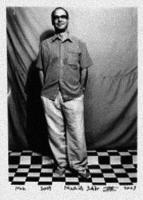 A particular cultural expression results from an expectation that a group has in relation to the culture and the world, but also in its hereditary burden, in what, in the English-speaking world, is well called heritage. Of course, because of tradition or expectation, many of these cultures and groups come into conflict. It may be productive, since it is assumed as a normal part of democracy. As there is negotiation between groups and cultural expressions, where the intervention in the city and political and social issues cannot be replaced by culture, we find ourselves in a rich and democratic situation. Cultural productions should translate that.
A particular cultural expression results from an expectation that a group has in relation to the culture and the world, but also in its hereditary burden, in what, in the English-speaking world, is well called heritage. Of course, because of tradition or expectation, many of these cultures and groups come into conflict. It may be productive, since it is assumed as a normal part of democracy. As there is negotiation between groups and cultural expressions, where the intervention in the city and political and social issues cannot be replaced by culture, we find ourselves in a rich and democratic situation. Cultural productions should translate that.
Face to face
06.10.2011 | by Marta Lança
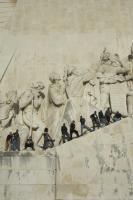 Lusosphere has a long way to go to become more interesting. If considered from the Portuguese standpoint, lusosphere reverberates the colonial past, people relate to and interest in the stories of each other more forcefully within the boundary of this "imagined community" that, despite this name, does not help them in living conditions and, if a Lusophone project exists, in most respects it has failed miserably.
Lusosphere has a long way to go to become more interesting. If considered from the Portuguese standpoint, lusosphere reverberates the colonial past, people relate to and interest in the stories of each other more forcefully within the boundary of this "imagined community" that, despite this name, does not help them in living conditions and, if a Lusophone project exists, in most respects it has failed miserably.
Games Without Borders
03.10.2011 | by Marta Lança
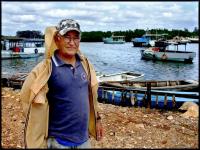 Carlos is the character I am most worried about. I’d only spent a few hours with him before, and I am not sure what he will reveal about his time in Angola and how that will fit into the film. He is a fisherman, his skin deeply tanned from a lifetime at sea.
Carlos is the character I am most worried about. I’d only spent a few hours with him before, and I am not sure what he will reveal about his time in Angola and how that will fit into the film. He is a fisherman, his skin deeply tanned from a lifetime at sea.
Afroscreen
01.10.2011 | by Dulce Fernandes
 Beyond Boetjan and the South African connection, occupation of one form or another has always been part of the collective psyche of Mozambique. Attempts to explore this, however, are far more recent. A new mixed media exhibition, Ocupações Temporárias (temporary occupations), sees five young Mozambican artists attempt to do just that.
Beyond Boetjan and the South African connection, occupation of one form or another has always been part of the collective psyche of Mozambique. Attempts to explore this, however, are far more recent. A new mixed media exhibition, Ocupações Temporárias (temporary occupations), sees five young Mozambican artists attempt to do just that.
I'll visit
01.10.2011 | by Dave Durbach
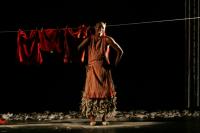 Multiple award-winning dancer, choreographer, teacher and development activist Mamela Nyamza, the 2011 Standard Bank Young Artist Award Winner for Dance, started using dance to translate the world around her as a child growing up in Gugulethu in the 1980s.
Multiple award-winning dancer, choreographer, teacher and development activist Mamela Nyamza, the 2011 Standard Bank Young Artist Award Winner for Dance, started using dance to translate the world around her as a child growing up in Gugulethu in the 1980s.
Stages
28.09.2011 | by SouthAfrica Reporter
 The solo violin playing of Isaac Molelekoa is so impressive, melancholic and space pervading that the viewers are dispelled. Extremely slow a dancer becomes visible, who stands in a narrow cone of light in the center of the stage. It is a quiet, strong and contrastive picture - this disturbing music of the violinist, that encourages you to move either internally or externally, and the continued structural integrity of the dancer Maqoma on stage.
The solo violin playing of Isaac Molelekoa is so impressive, melancholic and space pervading that the viewers are dispelled. Extremely slow a dancer becomes visible, who stands in a narrow cone of light in the center of the stage. It is a quiet, strong and contrastive picture - this disturbing music of the violinist, that encourages you to move either internally or externally, and the continued structural integrity of the dancer Maqoma on stage.
Stages
22.09.2011 | by Grit Köppen
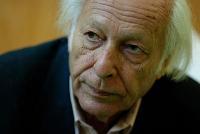 Isn't only about toppling the reigning dictators, but it is an enduring protest movement challenging, at the same time, both various dimensions of the internal social order, especially glaring inequalities in income distribution, and the international order, the place of Arab countries in the global economic order.
Isn't only about toppling the reigning dictators, but it is an enduring protest movement challenging, at the same time, both various dimensions of the internal social order, especially glaring inequalities in income distribution, and the international order, the place of Arab countries in the global economic order.
Face to face
19.09.2011 | by Samir Amin
 I set lusosphere as a debate far from any substance, a virtual focus that, referring to Portuguese language, develops its own dynamics in different national contexts. Far from being in front of a consensual thought, lusosphere hovers on situations of tension that put in contact these different contexts with each other.
I set lusosphere as a debate far from any substance, a virtual focus that, referring to Portuguese language, develops its own dynamics in different national contexts. Far from being in front of a consensual thought, lusosphere hovers on situations of tension that put in contact these different contexts with each other.
To read
17.09.2011 | by Omar Thomaz Ribeiro
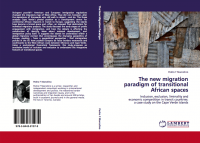 Pedro F. Marcelino has released a study on the new migratory paradigm emerging in post-9/11 Cape Verde. The study reflects a socio-economic context in which out-migration to traditional overseas destinations is no longer the only migratory phenomenon in the islands. The country has seen a steep increase in part- and full-time resident Europeans, as well as Chinese and continental African migrants. The research proposes that anti-terrorist measures and immigration control policies in both the USA and the EU after 9/11 have altered the migratory map of West Africa, whilst failing to curb people’s aspirations to depart and seek a better life.
Pedro F. Marcelino has released a study on the new migratory paradigm emerging in post-9/11 Cape Verde. The study reflects a socio-economic context in which out-migration to traditional overseas destinations is no longer the only migratory phenomenon in the islands. The country has seen a steep increase in part- and full-time resident Europeans, as well as Chinese and continental African migrants. The research proposes that anti-terrorist measures and immigration control policies in both the USA and the EU after 9/11 have altered the migratory map of West Africa, whilst failing to curb people’s aspirations to depart and seek a better life.
To read
16.09.2011 | by Pedro José-Marcellino aka P.J. Marcellino
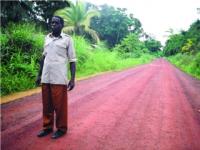 Stating that sorcery exists in Mozambique is a mere declaration of an obvious and recurring fact. People may use it in order to obtain active results or to protect oneself from undesirable events, in the pursuance of legitimate or illegitimate, beneficial or malevolent goals. The effectiveness of this practice is, nonetheless, an issue that tends to divide readers between outspoken scepticism, attitudes of plausible doubt, complex speeches about its symbolic efficacy, and a somewhat apprehensive fear or agreement.
Stating that sorcery exists in Mozambique is a mere declaration of an obvious and recurring fact. People may use it in order to obtain active results or to protect oneself from undesirable events, in the pursuance of legitimate or illegitimate, beneficial or malevolent goals. The effectiveness of this practice is, nonetheless, an issue that tends to divide readers between outspoken scepticism, attitudes of plausible doubt, complex speeches about its symbolic efficacy, and a somewhat apprehensive fear or agreement.
To read
15.09.2011 | by Paulo Granjo
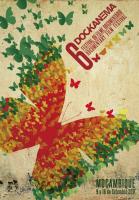 This year, as we embark on the sixth edition of Dockanema, my purpose is also one of remembrance, so that we do not forget the importance of documentaries in our society, and above all in our collective memory. To reaffirm this purpose once more, there could be no better choice for the opening of the 6th Dockanema than the Patrício Guzman film Nostalgia da Luz, in an edition intended to pay homage to the master filmmaker Ruy Guerra.
This year, as we embark on the sixth edition of Dockanema, my purpose is also one of remembrance, so that we do not forget the importance of documentaries in our society, and above all in our collective memory. To reaffirm this purpose once more, there could be no better choice for the opening of the 6th Dockanema than the Patrício Guzman film Nostalgia da Luz, in an edition intended to pay homage to the master filmmaker Ruy Guerra.
Afroscreen
07.09.2011 | by Pedro Pimenta
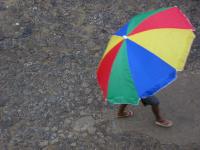 It is undeniable that in Lisbon there is a natural approximation of Portuguese-speaking people, not Portuguese of nationality, even when they do not share the same race and culture. National differences reduce face to the discrimination which all are submitted to. And it makes full sense to think about this reduction as a need for resistance to discrimination, because the metropole turns homogeneous all the ex-colonized, grouping them in the categories of “nigger”, “black”, “immigrant”.
It is undeniable that in Lisbon there is a natural approximation of Portuguese-speaking people, not Portuguese of nationality, even when they do not share the same race and culture. National differences reduce face to the discrimination which all are submitted to. And it makes full sense to think about this reduction as a need for resistance to discrimination, because the metropole turns homogeneous all the ex-colonized, grouping them in the categories of “nigger”, “black”, “immigrant”.
To read
03.09.2011 | by António Tomás
 The thud of hypocrisy does not end here. Seven months after Cameron criticised Egypt's efforts to block access to the internet, he is now considering increasing British police powers over social media networks like Twitter, Facebook and BlackBerry Messenger. Echoing the views of more authoritarian regimes, the prime minister says, 'Free flow of information can be used for good. But it can also be used for ill.'
The thud of hypocrisy does not end here. Seven months after Cameron criticised Egypt's efforts to block access to the internet, he is now considering increasing British police powers over social media networks like Twitter, Facebook and BlackBerry Messenger. Echoing the views of more authoritarian regimes, the prime minister says, 'Free flow of information can be used for good. But it can also be used for ill.'
City
18.08.2011 | by Lara Pawson
 Lusosphere has been traditionally intended on the basis of progressively reducing dimensions: the geographic one, that unite the eight countries of the Community of Portuguese Speaking Countries (Portuguese: Comunidade dos Países de Língua Portuguesa, CPLP); the political one, that is confined to Portuguese speaking communities spread all over the world; and finally, the historical and cultural one, related to the Portuguese inheritance in different parts of the earth during the maritime expansion and the colonial empire.
Lusosphere has been traditionally intended on the basis of progressively reducing dimensions: the geographic one, that unite the eight countries of the Community of Portuguese Speaking Countries (Portuguese: Comunidade dos Países de Língua Portuguesa, CPLP); the political one, that is confined to Portuguese speaking communities spread all over the world; and finally, the historical and cultural one, related to the Portuguese inheritance in different parts of the earth during the maritime expansion and the colonial empire.
To read
03.08.2011 | by Lurdes Macedo